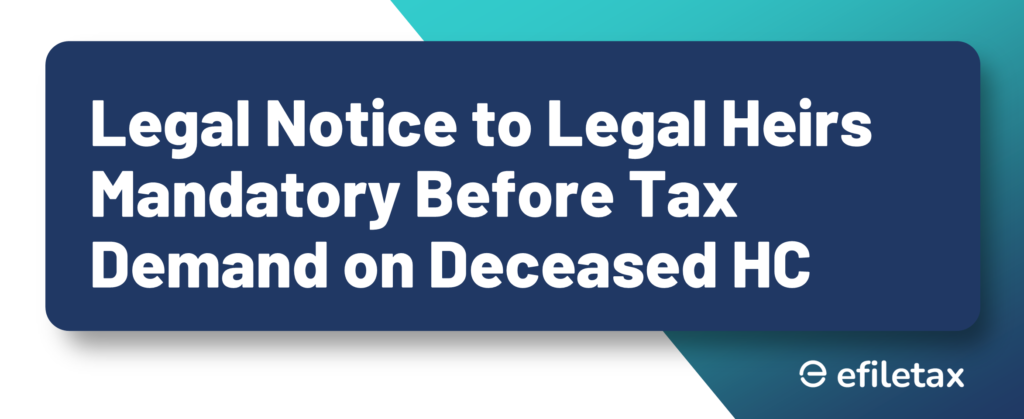
Can the Income Tax Department Raise Demand on a Deceased Person?
If a taxpayer passes away, can tax proceedings still continue?
A recent High Court ruling clarifies a critical point: you cannot fasten tax liability on a dead person without first notifying their legal representatives. This interpretation under Section 93 of the Income-tax Act offers major relief for families caught in posthumous tax disputes.
What Section 93 of the Income-tax Act Says
Section 93 deals with liability in special cases, including proceedings against a deceased person’s estate. The law clearly states that legal representatives can be held liable only after notice is served to them.
Key points:
- Tax cannot be assessed against someone who is no longer alive.
- Before any order or penalty, the Income Tax Officer must notify the legal heirs.
- The estate of the deceased is liable only to the extent of the assets inherited.
High Court Ruling: Demand Without Notifying Legal Heirs Is Invalid
In a recent judgment (refer TMI Case ID 88226), the High Court quashed a tax demand order raised after the taxpayer had died—because no notice was sent to the legal heirs before finalizing the assessment.
Why this matters:
- Legal heirs have the right to respond before any liability is fixed.
- Even if the taxpayer had pending dues, the department must re-initiate proceedings by issuing fresh notice to the heirs.
- Otherwise, the order becomes unenforceable in law.
CBDT’s Own Clarification Matches This View
The CBDT’s internal circulars (and departmental practice) also support the position that once a taxpayer dies, the PAN becomes inactive and a new procedure under Section 159 or 93 must follow.
Expert View
CA Ramesh R., a tax practitioner in Chennai, says:
“Tax officers must remember they are dealing with families already in emotional distress. Following due legal process isn’t optional—it’s a constitutional obligation.”
What Legal Heirs Should Do
If you receive a tax notice in the name of someone who has passed away:
- Check the date of the notice. If it was issued after the date of death, it may be invalid.
- Respond to the department citing Section 93 and attach the death certificate.
- Seek professional help if a demand has already been raised. You may be able to challenge it.
Comparison Table – Tax Proceedings Before and After Death
| Scenario | Before Death | After Death |
|---|---|---|
| Notice issued to taxpayer | Valid | Invalid – must be sent to legal heirs |
| Tax demand in deceased’s name | Enforceable | Unenforceable if heirs not notified |
| Legal responsibility | On taxpayer | Limited to estate in heirs’ possession |
Legal References
- Section 93, Income-tax Act, 1961
- Section 159, Income-tax Act, 1961 (Legal Representatives)
- HC Ruling in TMI Case ID 88226
- Income Tax India – Official Site
Summary
A tax demand cannot be raised against a deceased taxpayer without notifying legal heirs under Section 93. The High Court ruled such proceedings as invalid unless legal representatives are informed and given a chance to respond. Family estate liability is also limited by law.
FAQs
Q1: Can I ignore a tax notice issued to my deceased parent?
No. You must respond formally and submit the death certificate. Also cite Section 93.
Q2: Are legal heirs personally liable for the full tax dues?
Only to the extent of the estate/assets inherited—not beyond that.
Q3: Does the PAN get cancelled after death?
Yes, it becomes inactive upon death and must be updated in the records.